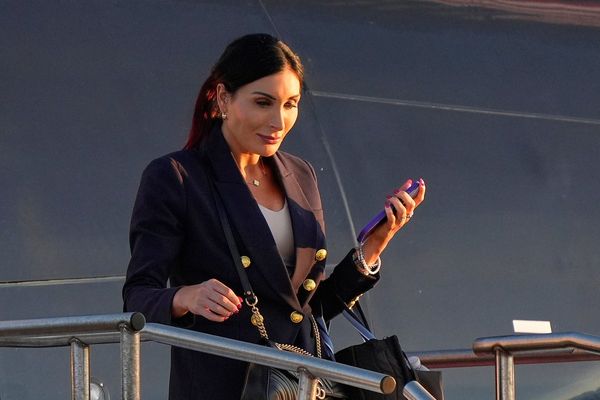
When Luigi Mangione walked into a Manhattan federal courtroom on Thursday afternoon, he looked like any number of smartly dressed defendants prosecuted here – not someone accused of a brutal murder on the streets of New York that caused headlines around the world and a national manhunt.
Mangione, 26, is accused of shooting UnitedHealthcare chief executive Brian Thompson in a brazen street assassination that also sparked a national outpouring of social media vitriol from many Americans against the healthcare industry.
It was a crime that felt almost unique in recent US criminal history and left many observers uneasy about the lionization of Mangione in some quarters of US society – despite the charges against him and brutal slaying of a father of two.
But the accused now looked like any other suspect who’d transitioned from arrest garb to proper courtroom clothing. He was no longer wearing the orange jumpsuit in which he was repeatedly photographed following his 9 December arrest at a McDonald’s in Altoona, Pennsylvania. Instead he sported khaki pants, a white collared shirt, and a three-quarter zip pullover that, depending on one’s courtroom vantage point, was either navy blue or black.
Mangione appeared to have had a haircut since going into custody. The hair around his temples, and nape of his neck, seemed to be newly shaved down, or at least competently groomed. The only aesthetic hint that Mangione was on the hook for a violent crime were his shackled ankles and jail-issued neon slip-ons.
Manhattan state prosecutors had announced on Tuesday that Mangione had been indicted on one count of first-degree murder, “in furtherance of terrorism”, two counts of second-degree murder, one of which was billed as “killing as an act of terrorism”, and several weapons counts.
Mangione was originally expected to appear in Manhattan supreme court for state-level criminal charges. That plan changed after a federal criminal complaint came down charging Mangione with murder through use of a firearm, stalking (travel in interstate commerce), stalking (use of interstate facilities), and a firearms offense.
Federal charges also carry far graver potential consequences for Mangione. New York state does not have the death penalty, but the federal government does. The maximum possible penalty for Mangione’s federal murder charge is life imprisonment or death.
The federal charges, as well as local authorities casting his alleged crime in terms of terrorism, have prompted questions about whether law enforcement officials were trying to make a point, to send a message – just as Mangione himself appeared to be making a point about US healthcare failures.
Indeed, Mangione, whose brief manifesto railed against the high costs and poor outcomes in US healthcare, was heralded as a sort of folk hero in numerous online circles for taking on an industry which many say has perpetuated unnecessary illness and death.
In announcing state-level charges against Mangione, New York officials said the attack had struck fear in the hearts of corporate leaders and businesses, who have since seen a deluge of online threats.
“Let me say plainly: there is no heroism in what Mangione did,” said Jessica Tisch, the New York police department commissioner, at one point. “We don’t celebrate murders.”
Mangione’s demeanor in New York also marked a sharp departure from his initial court proceeding in Pennsylvania, where outside he shouted his arrest was “completely out of touch, and an insult to the intelligence of the American people”.
Before Manhattan federal magistrate Judge Katharine Parker entered the courtroom, Mangione chatted with his attorneys. He often kept his hands crossed.
When Parker took the bench, she told Mangione that he didn’t have to talk to authorities – even if he’d already made statements. Did he understand his rights? Yes. Did he see a copy of the criminal complaint? Yes.
Parker then made a general summary of the criminal complaint.
“Mr Mangione, do you understand what you’re being accused of?”
“Yes.”
Mangione’s attorneys opted not to make an argument for bail, but reserved the right to make their case for pretrial release later.
One of Mangione’s attorneys, Karen Friedman Agnifilo, voiced concern that his team had received conflicting signals on the cases against him. They had been told he would appear at Manhattan state court on Thursday afternoon – then came this federal curveball.
“This is a highly unusual situation we find ourselves in,” Agnifilo said. While Mangione’s federal and state cases involve the same alleged crime, theories of these offenses are wildly different. In Manhattan state proceedings, Mangione is accused of committing murder for terrorism purposes, whereas in federal court, the killing involves stalking, she said.
“One charge is death eligible,” Agnifilo said of the federal case, to emphasize her concerns about the potentially disjointed overlap. “Is there one case? Two cases? Two investigations?”
The judge told both sides to meet and discuss these concerns. Shortly after the proceeding, authorities provided some clarity about timing: according to a press release, Mangione’s state case is expected to go on trial before his federal prosecution.
Outside of court, Mangione’s appearance did draw several supporters. A group of several young people held signs with slogans such as “Health over wealth” and “ASK YOURSELF: WHO ARE THEY REALLY PROTECTING ?????????”
“This is not an issue of right versus left. It’s an issue of up versus down,” one of them said. “It doesn’t matter if you voted for Trump or Kamala, or Bernie in 2016 – I think everyone is waking up to the fact that there is a 1% population in this country that profits off of making the rest of us sick, poor, confused, angry and pointing the finger at one another, whether you believe in violence or not.”
There was another sign, on the ground, offering even stronger words of support. It read: “LUIGI FREED US.”







